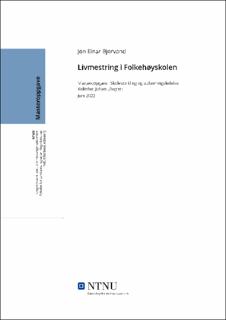| dc.contributor.advisor | Lövgren, Johan | |
| dc.contributor.author | Bjorvand, Jon Einar | |
| dc.date.accessioned | 2022-10-18T17:19:10Z | |
| dc.date.available | 2022-10-18T17:19:10Z | |
| dc.date.issued | 2022 | |
| dc.identifier | no.ntnu:inspera:114888479:47402771 | |
| dc.identifier.uri | https://hdl.handle.net/11250/3026768 | |
| dc.description.abstract | Livsmestringsbegrepet har gjort sitt inntog i norsk skole gjennom det nye tverrfaglige temaet folkehelse og livsmestring som ble innført som en del av kunnskapsløftet 2020 (Kunnskapsdepartementet, 2017). Kunnskapsdepartementet løfter frem samfunnsutfordringene som årsak til innføringen av det nye faget. Skolene skal da bidra til å løse utfordringene gjennom det nye livsmestringsfaget, men skolene kan ikke løse dette alene. Derfor slår rapporten fast at løsningen må finnes i et «felles engasjement og innsats fra enkeltmennesker og fellesskapet, nasjonalt og globalt» Videre anbefaler rapporten fra utvalget at kompetansebegrepet i skolen må utvides, og peker blant annet på viktigheten av sosial og emosjonell kompetanse for at elevene skal kunne lykkes senere i livet (NOU 2015:8, 2015).
Folkehøyskolene er ikke underlagt det samme læreplanverket, men har sitt formål og samfunnsmandat beskrevet i folkehøyskoleloven, hvor det står at «Folkehøyskolens formål er å fremme allmenndanning og folkeopplysning» (Folkehøyskoleloven, 2002). Livsmestring slik kunnskapsdepartementet beskriver innholdet, kan tolkes inn som en del av dannelsesoppdraget til folkehøyskolen.
Studien ønsker å undersøke elevens livsmestring i folkehøyskolen. Dybdeintervjuer av fire lærere i folkehøyskolen danner det empiriske grunnlaget for studien, som spesifikt ønsker å se nærmere på folkehøyskolens læringsmiljø og lærernes ledelse. Forskningsspørsmålene retter fokus på lærerens strategier i møte med elevens livsmestring, samt lærerens behov for kompetanse.
Selvbestemmelsesteorien (Ryan & Deci, 2017), er sentral i drøftingen av funnene i oppgaven. Læringsmiljøet og de tre universelle psykologiske behovene for autonomi, kompetanse og tilhørighet vil blir drøftet opp mot funnen i oppgaven. Teori om verdsettende ledelse og relasjonskompetanse vil sammen med livsmestringsbegrepet også flettes inn i denne drøftingsdelen.
Sentrale funn i oppgaven er lærerens bidrag til et behovsstøttende læringsmiljø. Ved gjennomgangen av det empiriske materiale er relasjoner og trygghet gjentagende temaer blant informantene. Relasjonen lærer-elev, relasjonen elev-elev, samt arbeidet med å føre trygghet inn i gruppen viser seg å være sentrale deler av lærernes ledelse. I forhold til lærerens kompetansebehov i møte med elevens livsmestring, så peker funnene i studiet mot lærernes behov for relasjonell og faglig kompetanse, og da spesifikt kompetanse innenfor psykisk helse. | |
| dc.description.abstract | The concept of life skills has made its way into Norwegian schools through the new interdisciplinary theme of Health and life skills, which was introduced as part of the Knowledge Promotion Reform 2020 (Ministry of Education, 2017). The Ministry of Education and Research highlights the societal challenges as the reason for the introduction of the new subject. The reform signals that while the public schools will contribute to solving these challenges through the new Life skills subject, they cannot solve this alone. The solution must be found in a "joint commitment and effort from individuals and the community, nationally and globally." Furthermore, the report from the committee recommends a widening of the definition of competence, and points towards emotional and social competence as areas which are essential for students' ability to succeed later in life (NOU 2015: 8, 2015).
The folk high schools are not subject to the same curriculum, but have their mandate described in the folk high school law, which states that " The folk high schools' purpose is to promote allmenndanning (bildung) and folkeopplysning (citizen education) " (Folkehøyskoleloven, 2002). Life skills as described by the Ministry of Education can be interpreted as part of the educational mission of the folk high school.
The study wants to investigate the student's development of Life skills in folk high school. In-depth interviews of four teachers at the folk high school form the empirical basis for the study, which focus on the learning environment of the folk high school's and teachers' leadership. The research questions focus on teacher's strategies in working towards increased life skills among their students, as well as the teacher's need for competence in this area. Self-Determination Theory (Ryan & Deci, 2017) takes a central part in the discussion of the findings in the thesis. The learning environment and the three universal psychological needs for autonomy, competence and belonging will be discussed against the findings of the thesis. Theories of value based leadership theory as well as relational competence will, together with the concept of life skills, be woven into this part of the discussion.
Central findings in the study are the teacher's contribution to a needs-supporting learning environment. In the analysis of the empirical material, relationships and security are recurring themes among the informants. The teacher-student relationship, the student-student relationship, and the teachers' aim of work producing a secure environment for the students are found to be central parts of the teachers' leadership. The need for further competence are seen in the area of developing student's life skills, especially teachers' need for competence in dealing with students' mental health. | |
| dc.language | nob | |
| dc.publisher | NTNU | |
| dc.title | Livsmestring i Folkehøyskolen | |
| dc.type | Master thesis | |
